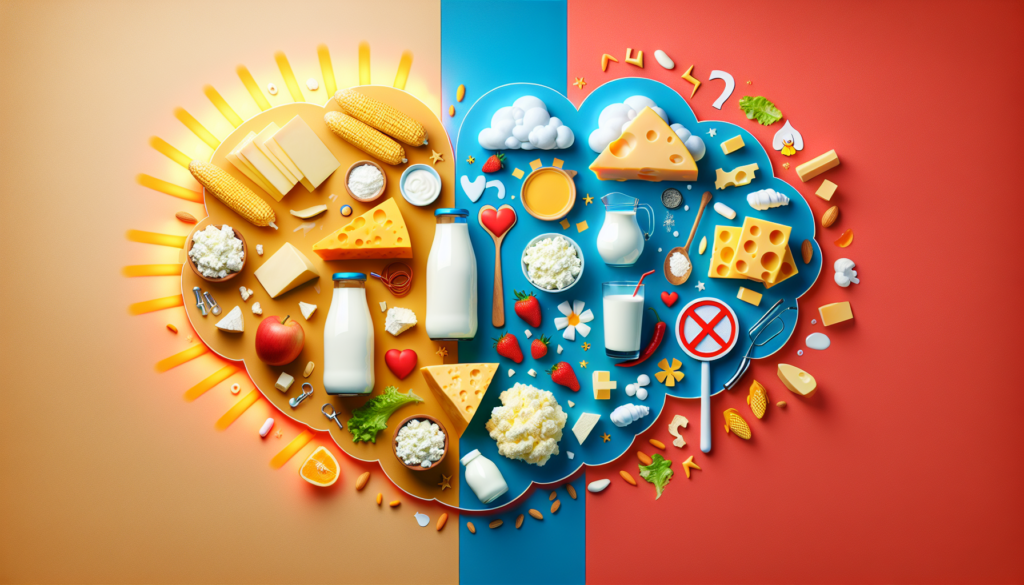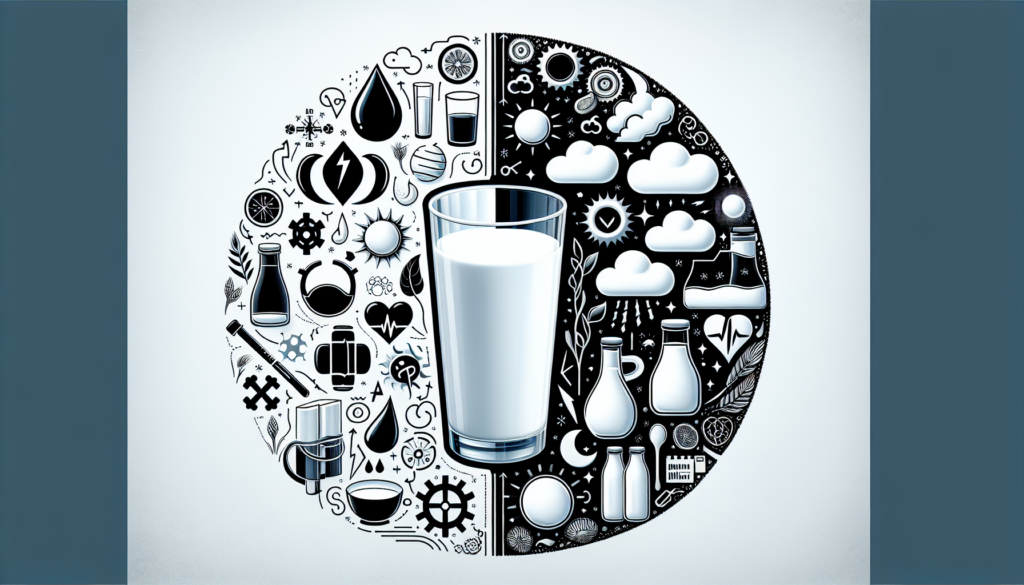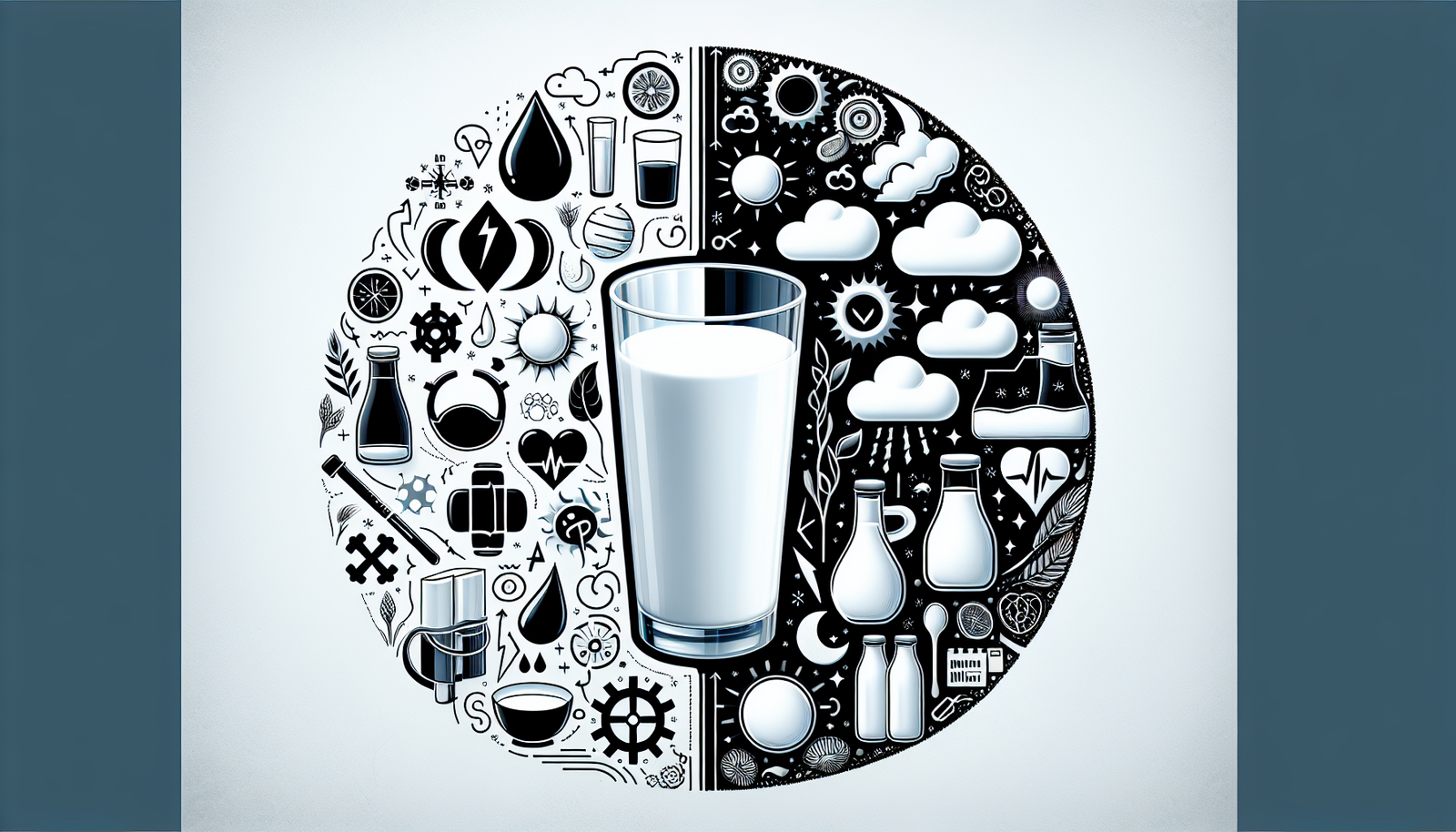In today’s health-conscious world, there is an ongoing debate about the role of dairy in our diets. Some argue that it is an essential component, providing important nutrients like calcium and protein, while others believe that it is unnecessary and even detrimental to our health. This article will explore both sides of the argument, giving you a better understanding of whether dairy is truly necessary or not. Whether you’re a dairy enthusiast or someone looking to make an informed dietary choice, this article will provide you with valuable insights to help you navigate the dairy dilemma.
The Basics of Dairy
What is Dairy?
Dairy refers to products that are derived from the milk of mammals, most commonly cows, but also goats, sheep, and buffalo. These products include milk, cheese, yogurt, butter, and ice cream. Dairy is a staple in the diet of many people around the world, providing a valuable source of nutrients and flavors in various culinary traditions. It is consumed in both its liquid form and as processed products that offer a wide range of textures and tastes.
Types of Dairy Products
Dairy products come in various forms and serve different purposes in cooking and nutrition. Milk, the most basic form of dairy, is a versatile liquid that can be consumed as is, used for making beverages like coffee and tea, or incorporated into recipes to add richness and creaminess. Cheese, another popular dairy product, is a concentrated form of milk that is made by separating the dairy solids from the liquid and allowing the solids to ferment and age. This process creates a wide variety of cheeses with different textures and flavors. Yogurt is a fermented milk product that offers a tangy taste and creamy texture, often consumed as a standalone snack or used as an ingredient in smoothies, dressings, and sauces. Butter, a creamy spread made from churning milk or cream, adds richness and flavor to dishes, while ice cream provides a delightful cold treat that is loved by people of all ages.
The Nutritional Value of Dairy
Calcium Content
One of the main reasons why dairy is praised for its nutritional value is its high calcium content. Calcium is a crucial mineral that plays a vital role in maintaining strong and healthy bones and teeth, as well as making sure our muscles and nerves function properly. Consuming adequate amounts of calcium from dairy products can help prevent conditions such as osteoporosis and tooth decay. In addition, calcium is also essential for blood clotting and maintaining a regular heartbeat.
Protein Content
Dairy products are a great source of high-quality protein, which is important for growth, repair, and maintenance of tissues in the body. Proteins are made up of amino acids, and dairy provides all the essential amino acids that our bodies need but cannot produce on their own. These complete proteins found in dairy are easily digested and absorbed by the body, making it an excellent choice for meeting your protein needs.
Vitamin and Mineral Content
Dairy is also a rich source of essential vitamins and minerals. It contains significant amounts of vitamins A and D, which are important for immune function, vision, and bone health. Additionally, dairy products provide B-vitamins, such as riboflavin, which help convert food into energy, and vitamin B12, which is important for nerve function and the production of red blood cells. Minerals like phosphorus, potassium, and magnesium are also found in dairy, contributing to overall good health.

Health Benefits of Dairy
Stronger Bones
As mentioned earlier, dairy products are known for their high calcium content, which is vital for bone health. Consuming an adequate amount of calcium, along with vitamin D and phosphorus found in dairy, helps to build and maintain strong bones and teeth, reducing the risk of fractures and osteoporosis. This is especially important during childhood and adolescence, when bone development is at its peak, but it continues to be beneficial throughout life.
Improved Digestive Health
Yogurt, in particular, has been associated with improved digestive health due to its probiotic content. Probiotics are beneficial bacteria that can help maintain a healthy balance of microorganisms in the gut. Regular consumption of yogurt and other probiotic-rich dairy products may help alleviate symptoms of gastrointestinal issues such as irritable bowel syndrome (IBS), improve digestion, and support a healthy gut microbiome.
Enhanced Muscle Growth
Dairy products, especially milk and cheese, are well-known for their muscle-building properties. The combination of high-quality protein, essential amino acids, and other nutrients found in dairy can help support muscle growth and repair after exercise. This makes dairy a popular choice for athletes and those looking to build or maintain muscle mass.
The Controversies Surrounding Dairy
Lactose Intolerance
Lactose intolerance is a common digestive disorder where the body is unable to fully digest lactose, the natural sugar found in milk. This occurs due to a deficiency of lactase, the enzyme responsible for breaking down lactose. Symptoms of lactose intolerance include bloating, gas, diarrhea, and stomach cramps after consuming dairy products. While lactose intolerance is not an allergy, it can cause discomfort and may require individuals to limit or avoid dairy consumption. However, there are lactose-free dairy products available that have the lactose already broken down, making them suitable for those with lactose intolerance.
Allergies and Sensitivities
Some individuals may have an allergic reaction to dairy proteins, specifically casein and whey. Milk allergies typically manifest in childhood and can cause symptoms such as hives, wheezing, vomiting, and diarrhea. Dairy sensitivities, on the other hand, are less severe but can still cause digestive issues, skin problems, and respiratory symptoms. It is important for individuals with dairy allergies or sensitivities to avoid dairy products or seek suitable alternatives.
Hormones and Antibiotics in Dairy
One concern regarding the consumption of dairy products is the presence of hormones and antibiotics. Dairy cows are often treated with growth hormones to increase milk production, and they may receive antibiotics to prevent or treat infections. While these substances are tightly regulated and monitored, some individuals may prefer to choose organic or hormone-free dairy products to minimize their exposure. However, it is important to note that the levels of hormones and antibiotics found in dairy products are minimal and unlikely to have significant health effects when consumed in moderation.

Dairy Substitutes
Plant-Based Alternatives
For those who choose to avoid or cannot consume dairy products, there are a variety of plant-based alternatives available. These include soy milk, almond milk, rice milk, oat milk, and coconut milk. These dairy substitutes are made from plant sources and are often fortified with calcium and other vitamins and minerals to mimic the nutritional profile of dairy. They can be used in the same way as dairy milk in recipes, coffee, tea, or enjoyed on their own.
Lactose-Free Products
Lactose-free dairy products are another option for individuals with lactose intolerance. These products have the lactose already broken down through the addition of the lactase enzyme, making them easier to digest. Lactose-free milk, yogurt, cheese, and ice cream enable individuals with lactose intolerance to enjoy the taste and nutritional benefits of dairy without the discomfort.
Ethical and Environmental Considerations
Animal Welfare
The production of dairy products involves keeping and milking animals, which raises questions about animal welfare. It is important for consumers to be aware of how the animals are treated and cared for in the dairy industry. Many farmers and organizations are dedicated to providing proper living conditions, access to pasture, and humane treatment for dairy cows. Choosing dairy products from farms that prioritize animal welfare can help ensure that the animals are treated with respect and compassion.
Sustainable Farming Practices
Dairy farming can also have an impact on the environment, particularly in terms of land use, water usage, and greenhouse gas emissions. However, there are sustainable farming practices that can mitigate these impacts. For example, some dairy farmers implement regenerative agriculture techniques, which focus on building healthier soils, reducing chemical inputs, and improving biodiversity. These practices can help minimize the environmental footprint of dairy farming, making it a more sustainable choice.
The Dairy Industry’s Economic Impact
Job Creation
The dairy industry plays a significant role in job creation, providing employment opportunities for farmers, milk processors, dairy product manufacturers, and distributors. From the small family-owned dairy farms to large-scale dairy operations, the industry supports livelihoods and contributes to local economies.
Contribution to GDP
Dairy production and the associated supply chain make up a considerable portion of the Gross Domestic Product (GDP) in many countries. The economic impact extends beyond the direct sector to industries such as transportation, packaging, and retail that support the production and distribution of dairy products. The dairy industry contributes to the economic stability and growth of nations.
Dairy in Different Cultural Contexts
Traditional Dairy Consumption
Dairy products have a rich history and are integral to the culinary traditions of many cultures around the world. In European cuisine, cheese, butter, and milk are staples, used in various dishes and enjoyed in their original forms. Indian cuisine incorporates dairy in the form of yogurt, paneer (a type of cheese), and ghee (clarified butter). These dairy products are essential ingredients in curries, desserts, and beverages. Similarly, Middle Eastern cuisine features yogurt and labneh, a strained yogurt, which are commonly used as toppings, spreads, or accompaniments to savory dishes.
Religious and Cultural Restrictions
In some religions and cultures, dairy consumption is restricted or prohibited. For example, in certain sects of Buddhism and Jainism, followers abstain from consuming any animal products, including dairy. In Hinduism, certain subgroups avoid beef but consume dairy products. Similarly, some individuals practicing a vegan lifestyle exclude dairy due to ethical and environmental considerations. These dietary choices are deeply influenced by cultural and religious beliefs and personal values.
Personal Choice and Dietary Requirements
Individual Health Considerations
Whether dairy is necessary or not depends on an individual’s health needs and requirements. For most people, dairy products can be a valuable source of important nutrients. However, some individuals may need to limit or avoid dairy due to lactose intolerance, allergies, sensitivities, or other health conditions. It is best to consult with a healthcare professional or registered dietitian to determine the right approach for your individual health needs.
Vegetarian and Vegan Diets
Dairy plays a significant role in vegetarian diets as it provides a source of high-quality protein and essential nutrients. However, individuals following a vegan diet choose to exclude all animal products, including dairy, from their lifestyle. With careful planning and the inclusion of appropriate plant-based alternatives, it is possible to meet nutritional needs without consuming dairy.
Conclusion
In conclusion, dairy products offer a wide range of nutritional benefits and culinary delights. With their high calcium and protein content, they promote strong bones, improved digestive health, and enhanced muscle growth. However, it is important to consider individual health considerations, such as lactose intolerance or allergies, and ethical and environmental factors when deciding on dairy consumption. Whether dairy is necessary or not depends on personal choice, cultural context, dietary requirements, and overall well-being. By making informed choices and considering suitable dairy substitutes, individuals can maintain a balanced and wholesome diet while accommodating their specific needs and preferences.

